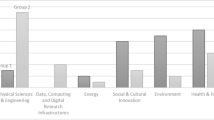
Overview
- Offers an original inquiry based on extensive archival research into the political history of EU research policy
- Highlights the influence of international political ideas on EU policy rather than focusing merely on national interests and European institutions
- Combines methods from political science and history to provide an innovative study targeted to researchers, students, practitioners, bureaucrats, and politicians
Part of the book series: Europe in Transition: The NYU European Studies Series (EIT)
Access this book
Tax calculation will be finalised at checkout
Other ways to access
About this book
This book describes the emergence of research policy as a key competence of the European Union (EU). It shows how the European Community (EC, the predecessor of the EU), which initially had very limited legal competence in the field, progressively developed a solid policy framework presenting science and research as indispensable tools for European economic competitiveness and growth. In the late 20th century Western Europe, hungry for growth, concerned about the American technological lead, and keen to compete in the increasingly open international markets, the argument for a joint European effort in science and technology seemed plausible. However, the EC was building its new functions in an already crowded field of European research collaboration and in a shifting political context marked by austerity, national rivalries, new societal and environmental challenges, and emerging ambivalence about science. This book conveys the contested history of one of the EU’s most successful policies. It is a story of struggle and frustration but also of a great institutional and intellectual continuity. The ideational edifice for the EC/EU research policy that was put in place during the 1960s and 1970s years proved remarkably robust. Its durability enabled the rapid takeoff of the European Commission’s initiatives in the more favorable political atmosphere of the early 1980s and the subsequent expansion of the EU research funding instruments and programs that permanently transformed the European research landscape.
Similar content being viewed by others
Keywords
- knowledge-based economy
- Lisbon Agenda
- Horizon 2020
- Organization for Economic Co-operation and Development
- OECD
- EC/EU
- European integration
- Euratom
- European Commission
- COST
- European Cooperation in Science and Technology
- European Science Foundation
- Single European Act
- CREST
- ESPRIT
- European Union Politics
- European Politics
- EC Research Policy
- European Community
- European Research Policy
Table of contents (10 chapters)
-
Front Matter
Reviews
Authors and Affiliations
About the author
Veera Mitzner is the Future Earth Network Lead at the Sustainability Innovation Lab at Colorado, the University of Colorado Boulder, USA, where she designs and leads global efforts to strengthen sustainability science and knowledge-based decision-making. She holds a PhD in History and Civilization from the European University Institute, Italy.
Bibliographic Information
Book Title: European Union Research Policy
Book Subtitle: Contested Origins
Authors: Veera Mitzner
Series Title: Europe in Transition: The NYU European Studies Series
DOI: https://doi.org/10.1007/978-3-030-41395-8
Publisher: Palgrave Macmillan Cham
eBook Packages: Political Science and International Studies, Political Science and International Studies (R0)
Copyright Information: The Editor(s) (if applicable) and The Author(s) 2020
Hardcover ISBN: 978-3-030-41394-1Published: 02 June 2020
Softcover ISBN: 978-3-030-41397-2Published: 02 June 2021
eBook ISBN: 978-3-030-41395-8Published: 01 June 2020
Series ISSN: 2946-3637
Series E-ISSN: 2946-3645
Edition Number: 1
Number of Pages: XVIII, 282
Topics: European Union Politics, European Politics, Public Policy, International Organization, Political History, International Political Economy



